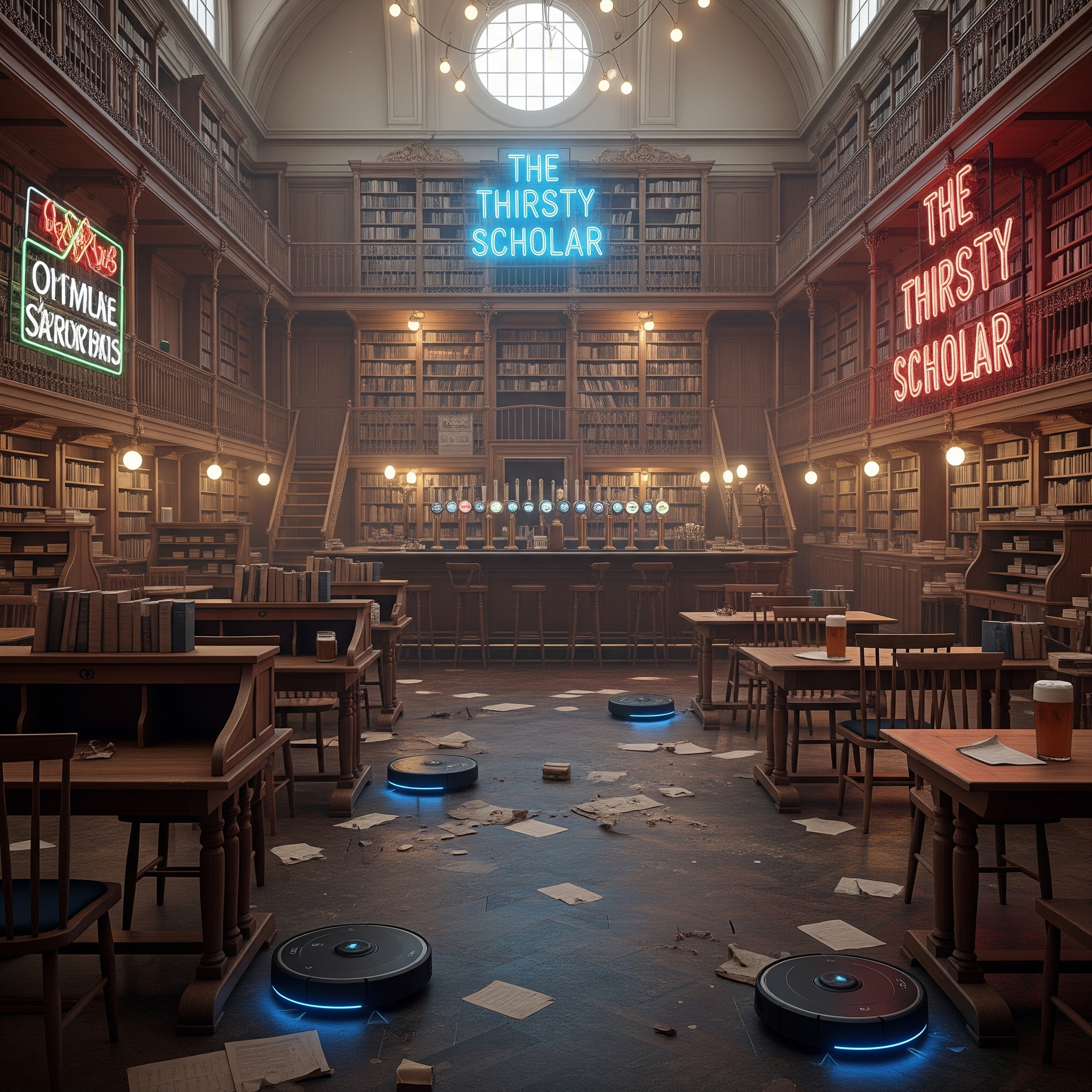MANCHESTER: MNEMONIC MANIAC
The message from Greta was a digital ghost, a single word that crackled with static and tasted of salt: Dyspoon. Below it, coordinates pointed to the heart of Manchester and a stark warning: He’s not boiling the oceans this time. He’s draining the mind.
The location was the old Portico Library, a bastion of nineteenth-century intellect, now desecrated by the screaming neon of a pub chain: ‘The Thirsty Scholar’. Inside, the sacred silence of generations had been butchered, replaced by the thumping bass of algorithm-generated music and the chemical sizzle of processed food. The air, once rich with the scent of aging paper and promise, was a greasy miasma of fried oil and spilled lager.

“The spiritual pressure here is dangerously low,” Scuba Dan rumbled, his deep voice a physical presence against the noise. His broad, muscular frame seemed to absorb the oppressive atmosphere, containing it like the immense pressures of the deep. He was a creature of the abyss, and this shallow place felt profoundly wrong.
Cairo Ken, immaculate in a white linen suit that defied the grime, ran a contemplative hand over his jaw. On his forearm, the intricate parrot tattoo seemed to watch their surroundings with a beady, intelligent eye. “He learns, Dan,” Ken murmured, his voice laced with the dry heat of a forgotten age. “After we stopped his desalination scheme in the Singapore Strait, he realized a direct assault is too crude. Now he seeks to create a vacuum, a spiritual desert.” He gestured to the patrons, their faces vacant, eyes locked on flickering screens, their conversations as thin as the dregs in their glasses.
Patrolling the floor were the silent, ominous agents of this new entropy: sleek, black robot vacuums. They navigated the sticky carpets with unnerving precision, their purpose far more sinister than cleanliness. They were erasing history, sanitizing thought, hoovering up the very psychic residue of the place.
Their contact, the library’s former archivist, met them in what was once the philosophy section. Her eyes were wells of exhaustion. “He calls it ‘Progress’,” she whispered, her voice a fragile thing. “Dyspoon offers them oblivion and calls it entertainment. They don’t just forget what this place was; he makes them grateful to forget.”
They found Dyspoon holding court in a gaudy booth, the robot vacuums circling him like devoted hounds. He was a man who seemed to consume the light, his smile a thin, bloodless line. The collective hum of his machines was the only thing that gave him substance.
“Ah, the titans of brine and antiquity,” Dyspoon sneered, a flicker of genuine annoyance in his eyes. “I should have known you’d surface. Come to sample the future?”
“You offer a poisoned well,” Ken retorted, his gaze sharp enough to cut through the manufactured cheer. He held up a hand, and the cacophony seemed to bend around them, creating a pocket of profound silence. “A narcotic for the soul.”
“And you cling to a world that’s already dead!” Dyspoon laughed, a dry, rasping sound. “Knowledge is a burden. I liberate them from its weight.”
“You enslave them with apathy,” Dan countered, his voice resonating with the power of a tidal surge. He placed a hand flat on the table, and the synthetic wood seemed to groan, the faux-grain darkening as if saturated with pure, deep-ocean pressure. The vacuums faltered, their lights flickering.
The confrontation was one of essences. Ken spoke of the intricate spells woven into the very fabric of reality, his words painting images of starlit deserts and lost constellations. Dan spoke of the crushing, silent wisdom of the abyssal plain, of the relentless cycle of the tides that answers to no man. They didn’t shout; they resonated, a harmonic frequency of truth against the dull drone of Dyspoon’s empty progress.
A ripple of something real passed through the room. A young man looked up from his phone, a ghost of curiosity in his eyes. A woman paused, her drink halfway to her lips, a forgotten dream surfacing. The vacuums spun, their programming momentarily scrambled by concepts they could not compute.
Dyspoon’s smile tightened into a mask of contempt. “Impressive,” he hissed, his voice low. “But this is just a single node. The network is vast.” They left him there, a petty king on a vinyl throne. But as they walked away, they knew this was no victory, merely a pause.
Hours later, alone in the hollowed-out library, Dyspoon watched Dan and Ken depart on a hidden monitor. His smile had returned, genuine and cold. On a larger screen, data streams poured in from the confused robots. It was a complex analysis of the energy signatures from Ken’s arcane utterances and the deep-sea resonance of Dan’s power.

“The variables are now quantified,” he murmured to the empty room. He tapped a command into a console, and a new directive spread silently to his network across the globe. “Phase one was observation,” he said, watching the data coalesce into a frightening new equation. “Phase two will be immunization.” He looked at the oblivious faces of his patrons on the screen, his gaze predatory. The next time they met, his flock wouldn’t just be distracted. They would be immune to the very concepts of wonder and truth. For Dyspoon, this wasn’t a defeat. It was a successful field test.
Meanwhile, a few miles away, the warm glow of The Cartographer’s Arms spilled onto a cobbled side street. Inside, the air was thick with the smell of old wood, hops, and history. There were no screens, only the low murmur of conversation and the clink of glasses.
Dan and Ken sat at a heavy oak table, a pint of dark, local bitter for Dan and a small, aromatic glass of amaro for Ken. They were an odd sight—the hulking, athletic man who seemed to belong to the sea and the unnaturally elegant scholar—but here, in a place of genuine character, they seemed to fit.

“His method is evolving,” Ken said, swirling the dark liquid in his glass. “He used to build machines to change the world. Now he builds machines to change the people who live in it. It’s a far more insidious form of engineering.”
“We pushed back the tide,” Dan said, taking a long drink of his pint. He appreciated the pub’s authenticity. It felt like a deep-water coral reef: ancient, complex, and teeming with real life, unlike Dyspoon’s sterile, artificial sandbar. “For today, at least.”
“Yes. For today,” Ken agreed, a weary but determined set to his jaw. “We reminded them that there are stories other than the ones he’s selling. But he’ll be back, with a new vintage of distraction.”
They fell into a comfortable silence, oblivious to the data streams coalescing in Dyspoon’s lair, unaware that their very powers had just been measured and weighed for a future weapon. For now, there was only the quiet hum of a proper pub, the taste of a decent drink, and the brief, hard-won peace between one battle and the next.
Outside, the Manchester night was deep, but the stars, for those who remembered to look up, were still there.
